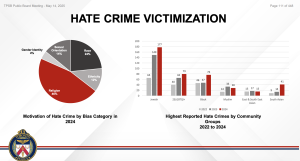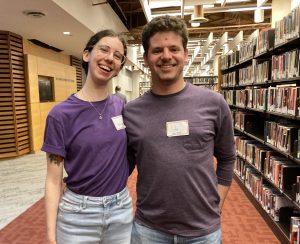People used to ask me whether I stopped observing Shabbat when I lived on my own in West Africa. I didn’t. I stopped the week before I flew there, in the streets of Jerusalem.
I was in Israel for a close friend’s wedding. He and I went to a Chabad street party for Simchat Torah. There, I saw grown men lunge with plastic forks at a four-foot-long cooked fish. Disposable plates and cups littered every surface. A drunken man slapped me clear across the face, unprovoked.
It was the capstone on a long year of feeling alien among my own people. A year of sitting at Shabbat dinner tables laden with factory-farmed meat, of casual Islamophobia, and that time at a dinner someone said getting into the oil industry was a great career move and everyone around the table nodded.
As I moved through my early 20s, my eyes opened to the workings of power in the world and the attendant inequality and suffering. The deeper I delved into an understanding of justice, the more shallow my connections felt with other observant Jews, for whom, it seemed, social justice concerns outside their community weren’t given much attention.
And so that Shabbat afternoon in Jerusalem, one week before the wedding, I walked up to my friend with deer-in-headlights eyes.
The words fell out of my mouth. “I need to go.”
He held my gaze, and nodded, understanding. I got on a Saturday bus to Tel Aviv. I hadn’t broken a single Shabbat since I’d begun keeping it four years prior. I haven’t kept one since.
Perhaps I shouldn’t have been surprised that concerns for justice pushed me away from my observance. It had been justice that drew me deeper into Jewish practice in the first place. My Grade 12 Jewish Ethics teacher taught us that one didn’t choose between believing in God or not, but between believing in the God of Judaism and the God of consumerism. And so, I took on religious practice like a protective cloak – a way of wrapping myself in a deeply ethical worldview, guarding against a secular culture that seemed to have no values of its own.
‘My spiritual worldview drew inward, toward the living authority of tissues and skin’
But as my politics evolved, the cloak seemed full of holes. The ways I’d learned to think in Jewish practice weren’t helping me to engage with what I thought the world needed from me, or from us as a Jewish community, to address problems like environmental destruction, income inequality and racism. My fingers grasped less tightly to that cloak of Jewish ethics. One Shabbat in Jerusalem, it fell away.
◊
I brought my siddur and tefillin to Cameroon, where I’d gone to spend half a year working in international development. I put them on a shelf, where they stayed, gathering red clay dust, until the day I left. Prayer had previously been a way for me to lose myself, to resolve inner tensions in a cosmic logic superseding my own. Otherworldly though it was, my Jewish practice had been rooted in a kind of reason. It had made sense to me to take a leap of faith. But as my political faith in Judaism faltered, my basis for leaping into worlds beyond me grew thin. If I was to have a spiritual practice, I would need something I could see and feel.
I waited. New habits found me. I started waking before dawn. I sat on the red clay ground of my apartment, wrapped in a heavy blanket against the early morning chill. I let my eyes fall shut, and waited for body sensations to present themselves. Each morning, a new rhythm and structure arose, unbidden, from within. I got lost in the pinky-orange spectra of the sunrise. I breathed deeply, until I felt my nerves uncoiling, my heart beating inside my chest.
READ: ROOTS AND KNOTS: COMING TO TERMS WITH NOT BEING ‘JEWISH ENOUGH’
For the first time in my life I began to feel the world as much as think it. The farther I travelled from rational principles of the sort my Jewish practice had been grounded in, the less likely it seemed I could find a home in Judaism. My spiritual worldview drew inward, toward the earthly beauty I received through my senses, the living authority of tissues and skin.
◊
After six months in Cameroon, I flew home to Toronto, and drove directly to my family seder. At first, I flipped through the Haggadah distantly. But as the seder progressed, the words of the text and the practices slowly came alive to me like never before.
We ate parsley, as always, to symbolize spring. But now that I had learned to feel the effects of foods on my body, I felt the parsley stimulating and reducing my tissues as it moved through me. In medical traditions linked to the seasons, the first spring greens are prized for their work in revitalizing the body and clearing away winter weight. Parsley does this; horseradish, too.
‘My friends and I tried to engage the broader Jewish community in our initiatives, but they didn’t respond’
My newfound embodiment was giving fresh meaning to Judaism’s rules and dictates. I began to explore the tradition’s mystic and land-based roots. I wondered: If I could find pathways to a more embodied spirituality through the Jewish practice I had grown up with, why had I never before found my way there? Have we as a community lost the links to less rational, more visceral, modes of practice? And, more troublingly, was there some purpose to keeping these forms away?
Two years ago in Toronto, I stumbled upon a community that wanted to ask these questions with me – a haphazard collection of young and youngish Jews trying to launch Jewish community projects of a new kind. Like me, each had stepped outside the conventional modes of being in the West: the heavy rationalism; the casual acceptance of chronic stress and exhaustion; the pervasive homophobia, sexism, and racism; the separateness from the living earth. Like me, they sought a deeper connection with themselves and others, and a new vision of what the world could be.
Together, we studied about the Bund in eastern Europe, the kibbutzim in Israel and the historic Jewish role in labour movements in Canada and the United States. For each of these movements, Judaism had functioned as an incitement to social change. But around the time of World War II, the Canadian Jewish community went a different way. Rather than trying to repair a world that had oppressed us, the new Jewish leadership responded to anti-Semitism by keeping quiet, striving to fit in.
This strategy has its costs. By conforming to the status quo, Jews have lost our capacity to critique it, and to stand with others suffering. When Jewish communities tie our fortunes to a system that has as its basic features factory farming, a destructive fossil-fuel economy and Islamophobia, we become complicit.
READ: MY JEWISH QUESTION: ON IDENTITY AND EDITING
My friends and I tried to engage the broader Jewish community in our initiatives, but they didn’t respond. We were perplexed: We heard community leaders bemoaning young Jews’ assimilation. Here we were, young, inspired, and ready to revitalize Jewish life! We couldn’t make sense of it. Wherever we tried to build a new paradigm of Judaism – to articulate forms of spiritual practice that could inspire a re-making of the world around us – the broader community re-committed itself to the trappings of contemporary Western culture. The community appeared to favour rationalism above all else, and to place authority far beyond our own bodies, in a patriarchal rabbinate and inaccessible divine.
◊
There’s an allegory in the Talmud in which Moses is sent by God into the future to watch a class being given by Rabbi Akiva. Moses is distressed; he can’t understand a single word of the lesson. Toward the end of the class, one of the students asks Rabbi Akiva about the source of his teachings. Rabbi Akiva replies, “It is the law given to Moses at Sinai.” Although Moses didn’t recognize the lessons Rabbi Akiva had gotten from the Torah he himself had received, the reader is assured that the teachings of Moses were still the root.
As our world changes, so too must our vision of it. And as our vision of the world changes, the practices we engage in must change. Sometimes, our practices might become unrecognizable to those who came before us. But we mustn’t become distressed. Rabbi Akiva didn’t bequeath us a Judaism that knows how to respond to climate change, racism or capitalism. So it’s up to us to devise one, and to know that what we come up with can also be the law given to Moses at Sinai.
◊
I still don’t observe Shabbat. But for the last two years, before my family seder, I’ve walked into the woods behind my parents’ home and gathered a few of the season’s first wild leek shoots, their taste pungent. I put them on the table, next to the parsley. The first year I did so, most of the guests at the table were afraid to eat them. By the second year, they recognized them. They tried them, and felt the spring.
Jason Hirsch grew up in the suburbs of Toronto, where he participated in diverse forms of Jewish life. He is currently a graduate student in medical anthropology at McGill University in Montreal.







